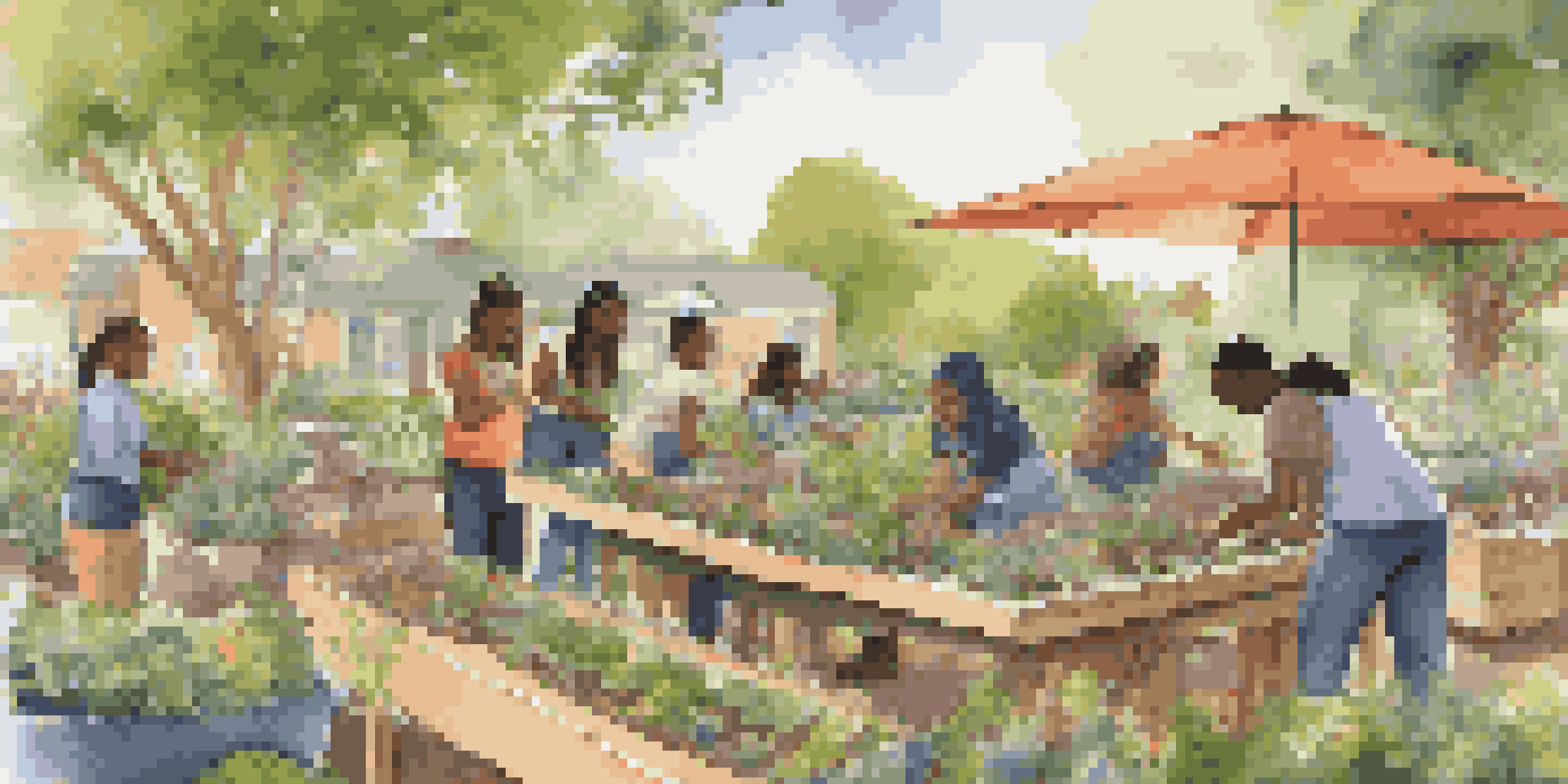The Role of Cultural Traditions in Sustainability Education

Understanding Cultural Traditions and Sustainability
Cultural traditions encompass the beliefs, practices, and values passed down through generations. These traditions often reflect a community's relationship with nature and resources, which is essential for sustainability. By understanding these connections, we can better appreciate how cultural heritage influences environmental stewardship.
We do not inherit the earth from our ancestors, we borrow it from our children.
For instance, many Indigenous groups have longstanding practices that promote sustainable land management. These practices, rooted in their cultural traditions, have been proven to maintain biodiversity and protect ecosystems. When we integrate these perspectives into sustainability education, we can learn valuable lessons about living harmoniously with our environment.
Moreover, recognizing the importance of cultural traditions helps foster respect and inclusivity in sustainability initiatives. By acknowledging diverse cultural perspectives, we encourage collaboration and shared learning, which are vital to addressing global environmental challenges.
Cultural Traditions as Educational Tools
Cultural traditions can serve as powerful educational tools in the realm of sustainability. They provide relatable and engaging examples that resonate with learners, making complex concepts easier to grasp. By using stories, rituals, and practices from various cultures, educators can effectively illustrate the principles of sustainability.

For example, a community that celebrates the harvest season can teach the importance of seasonal cycles and responsible resource use. Such traditions highlight the interconnectedness of people and nature, reinforcing the idea that sustainable practices are not just beneficial but also culturally significant.
Cultural Traditions Enhance Sustainability
Understanding and integrating cultural traditions fosters respect and inclusivity, essential for effective sustainability initiatives.
Furthermore, leveraging cultural traditions in education can inspire a sense of identity and belonging among learners. When students see their own cultural practices reflected in sustainability teachings, they are more likely to feel invested in protecting their environment.
The Impact of Cultural Narratives on Sustainability Mindsets
Cultural narratives shape how communities understand and interact with the environment. These stories often carry lessons about respect, conservation, and the consequences of exploitation. By incorporating these narratives into sustainability education, we can cultivate more profound awareness and commitment to environmental stewardship.
The greatest threat to our planet is the belief that someone else will save it.
For instance, many cultures have myths or folklore that emphasize the importance of caring for the Earth. These stories can instill values of sustainability in younger generations, teaching them to view their environment as a cherished entity rather than a resource to be exploited.
Additionally, integrating cultural narratives into educational programs can challenge dominant paradigms that prioritize industrial growth over ecological balance. By highlighting alternative perspectives, we can foster critical thinking and encourage learners to envision a more sustainable future.
Integrating Local Practices into Sustainability Education
Local practices often reflect a community's historical relationship with its environment. Integrating these practices into sustainability education can provide practical examples of sustainable living. This localized approach makes learning more relevant and actionable for students, allowing them to apply concepts in real-world contexts.
For instance, a community that practices permaculture can share its methods and philosophies with students. This hands-on learning experience not only teaches sustainable agricultural practices but also emphasizes the importance of community engagement and cooperation.
Education Benefits from Local Practices
Incorporating local practices into sustainability education provides practical examples and empowers students to advocate for their communities.
Moreover, showcasing local practices can empower students to become advocates for sustainability in their own communities. By learning about and participating in these practices, students can feel a sense of ownership over their local environment and inspire others to adopt sustainable behaviors.
Challenges in Incorporating Cultural Traditions
While cultural traditions offer rich resources for sustainability education, there are challenges in their integration. Misinterpretation or oversimplification of cultural practices can lead to appropriation rather than appreciation. It's crucial to approach cultural traditions with respect and a desire to learn, rather than to exploit them for educational purposes.
Additionally, some cultural practices may conflict with contemporary sustainability goals. It's essential to engage in open dialogue with community members to navigate these complexities. This collaborative approach ensures that educational content is both respectful and aligned with the community's values.
Lastly, educators need to continually update their knowledge and understanding of cultural contexts. As societies evolve, so do their traditions and practices, making ongoing education essential for effectively incorporating cultural traditions into sustainability education.
Collaborative Approaches to Sustainability Education
Collaboration among diverse cultural groups can enhance sustainability education by sharing knowledge and practices. This exchange can lead to innovative solutions inspired by traditional wisdom. By bringing together various cultural perspectives, we can create a more holistic understanding of sustainability.
For example, partnerships between Indigenous communities and educational institutions can foster mutual learning. Such collaborations allow students to learn directly from community members, bridging the gap between academic knowledge and lived experience.
Collaboration Fuels Innovative Solutions
Collaborative approaches among diverse cultural groups can inspire innovative solutions and promote mutual respect in sustainability education.
Moreover, collaborative approaches can help dismantle stereotypes and promote mutual respect. When students engage with different cultures, they develop empathy and a broader worldview, essential qualities for future environmental leaders.
The Future of Sustainability Education Through Cultural Traditions
Looking ahead, the role of cultural traditions in sustainability education will likely grow as we seek more inclusive and effective learning methods. By embracing diverse perspectives, we can foster a richer understanding of sustainability challenges and solutions. The future of education lies in recognizing that every culture has valuable insights to offer.
Moreover, as global environmental issues become increasingly urgent, incorporating cultural traditions can help inspire action. By drawing on the wisdom of various cultures, we can motivate learners to take a stand for sustainability in their communities and beyond.

Ultimately, the integration of cultural traditions into sustainability education is not just about preserving heritage; it's about creating a sustainable future that respects and honors our diverse backgrounds. Together, we can build a world where cultural diversity and environmental health go hand in hand.